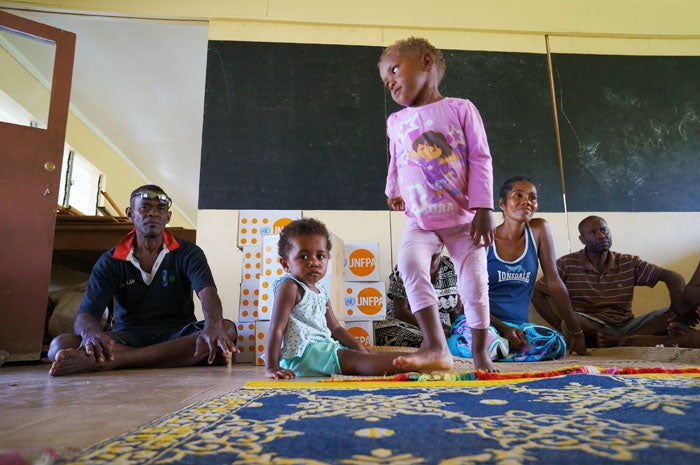UNFPA Pacific, Suva, Fiji (March 13, 2016) - The United Nations Central Emergency Response Fund (UN CERF) has approved an allocation of about US$500,000.00 for the United Nations Population Fund, UNFPA, to support the latter's work in protection and emergency reproductive health issues.
"The additional funding secured through the UN CERF is also a great confidence boost for both the UNFPA and our partners in terms of activities we intend to implement to support the cyclone recovery efforts by the Government of Fiji," Dr Laurent Zessler, UNFPA Pacific Sub-Regional Office Director and Representative, said.

The allocation which was confirmed on Saturday (March 12) compliments an injection of AU$400,000.00 from the Government of Australia (March 8); the latter's support will ensure the procurement of additional clean delivery kits, critical in health facilities of affected areas which continue to work without (normal) electricity supply.
To support work protection issues stemming from gender-based violence, UNFPA has ordered post-rape kits to provide needed emergency contraception and post-exposure prophylaxis to address the needs of sexual violence survivors, working with the Ministry of Social Welfare, Women and Poverty Alleviation and civil society organizations on the establishment of eight Women Friendly Spaces (WFS) in five priority provinces (Cakaudrove, Lomaiviti, Tailevu, Ra and Ba).
UNFPA is also supporting the Ministry of Social Welfare, Women and Poverty Alleviation and the Ministry of Health and Medical Services to strengthen referral services and increase community awareness on referral mechanisms for gender-based violence cases.
In collaboration with the Ministry of Health and Medical Services and the Fiji Nurses Association for the deployment of additional 20 Midwives for three-month relieving stints of health service providers in health facilities of affected areas.
Apart from technical support, the UNFPA has also procured 14 types of Reproductive Health Kits, including 3,000 clean delivery packs to ensure clean and safe deliveries in areas directly hit by the cyclone, which are expected to arrive in Fiji on March 16 (2016); most kits consist of equipment and supplies intended for the damaged health facilities to ensure the provision of life-saving RH services in the facilities the soonest time possible.
For more information, please visit our website or contact Ariela Zibiah on Phone: +679 3230711 Cell: +679 9991697 or Email: zibiah@unfpa.org

NOTE TO EDITORS
More than 1000 dignity kits of the initial 2000 initially procured by UNFPA have been distributed through the Ministry of Health and Medical Services (MOHMS) and other partner agencies, in 28 villages and settlements and 10 health facilities while 125 clean delivery packs were delivered to 12 health facilities in three sub-divisions.
As well, more than 200,000 male condoms were provided to MOHMS to replenish stocks and for distribution through national channels, to support sexually-transmitted infections and HIV prevention campaigns.
Another 4,400 dignity kits has been procured by UNFPA for distribution to women including pregnant and lactating women through the public health outreach missions of MOHMS. UNFPA is supporting the public health outreach missions of MOHMS with a focus on ensuring access to reproductive health information and services by the affected women.
Of the 350,000 directly affected population, 170,000 are female with 87,500 women of reproductive age. An estimated 14,800 people remain displaced in 476 evacuation centers. It is estimated that there are more than 5,600 pregnant women with nearly 1,600 deliveries expected in the next 3 months, around 200 of them expected to experience obstetric complications requiring emergency obstetric care.
Eight of the 204 health care facilities in the affected areas have sustained major damage while 55 had minor damage to infrastructure. This has a huge negative impact on access to life-saving maternal and neonatal health services which further puts women and their newborn at high risk of maternal and neonatal morbidity and mortality.

